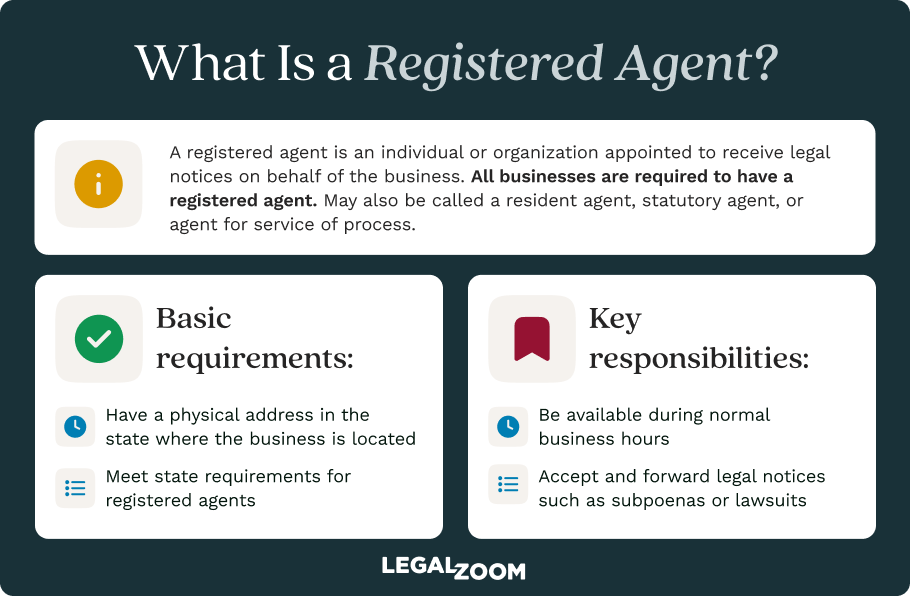Are you forming a corporation, LLC, or limited partnership in Florida? Or, will your out-of-state business be operating in Florida? If so, you need to designate a registered agent to receive service of process for your business. This isn’t just a role of convenience—it’s a legal requirement that helps ensure your business remains in good standing with the state.
This comprehensive guide covers everything you need to know about Florida's registered agent requirements, responsibilities, and procedures.
What is a registered agent in Florida?
A registered agent—sometimes called a statutory agent or resident agent—is a person or company designated by a business to receive official legal documents on behalf of the business entity. The registered agent serves as the official point of contact between your business and the state of Florida, ensuring that you receive important legal and governmental communications.
Under Florida Statutes Chapter 607 (corporations), Chapter 605 (LLCs), and Chapter 620 (limited partnerships), every registered business entity must maintain a registered agent and registered office in Florida. This requirement applies to both domestic entities (organized in Florida) and foreign entities (organized in another state, territory, or country) that conduct business in Florida. It also includes entities that own real estate or a mortgage in the state.
The registered agent must operate at a physical location in Florida, but they do not need to be in the same place as the business they represent.
What types of documents does a Florida registered agent receive?
Registered agents receive a number of different types of correspondence on behalf of a business:
- Service of process, including lawsuits, subpoenas, and other legal notices
- Compliance reminders, such as notices about Florida annual report filings
- Tax notices from the Florida Department of Revenue
- Other official government correspondence
Many of these notices are time-sensitive in nature, and having a designated registered agent available to receive them ensures you don’t miss critical deadlines or information related to your business.

Who can be a Florida registered agent?
Florida law establishes specific requirements for who can serve as a registered agent and where they must be located.
- The registered agent must maintain a street address in Florida, not a P.O. box, private mailbox, or mail service address. This physical address serves as the registered office.
- The registered agent must be available during regular business hours for service of process and document delivery (typically 9 a.m. to 5 p.m., Monday through Friday).
- The registered agent must provide formal consent to serve in this role. When you file formation documents with the Florida Division of Corporations, you’ll provide the registered agent’s information and have them sign to give their consent.
Can I be my own registered agent in Florida?
You can be your own registered agent in Florida, as long as you maintain a street address there where you’re available during business hours. However, it’s important to know that fulfilling your duties as registered agent can be difficult if you’re also trying to run a business. You may find it beneficial to appoint another trusted person, like a family member, or even hire a professional registered agent service to handle the job for you.
Here’s a comprehensive overview of the pros and cons of serving as your own registered agent vs. using a service.
| Being your own registered agent | Hiring a registered agent service | |
|---|---|---|
| Cost | No annual service fees | $100–$300 annually |
| Notifications | Immediate notice | Prompt notification through email or online |
| Control | Full control of document handling | Documents managed securely and efficiently |
| Availability | You must be present at the registered office during business hours | Your service provider is always available during business hours |
| Privacy | The registered address is public | Your address stays private |
| Professional image | Risk of being served legal papers in front of clients or employees | Service accepts legal documents privately |
| Address changes | Must file change forms and pay fees when moving | Service maintains a consistent address, even if your business relocates |
| Flexibility | Difficult if you travel often or work irregular hours | Allows you to work remotely or travel without missing documents |
| Best for | Businesses with stable Florida addresses and regular office hours | Businesses wanting privacy, convenience, and reliable compliance |
Can a business entity serve as its own registered agent in Florida?
Under Florida law, a business entity cannot serve as its own registered agent. However, an individual associated with the business entity, such as the owner or an employee, can serve as registered agent. You can also employ a separate business entity to be your company’s registered agent, so long as the entity is authorized to do business in Florida, with a Florida business address.
How do I appoint a registered agent in Florida?
The process for appointing a registered agent in Florida involves specific forms and procedures. Here's a detailed step-by-step guide.
Step 1: Confirm agent's consent and details
Before filing any forms, make sure your new registered agent meets all Florida eligibility requirements and agrees to serve in this role. They must provide their complete Florida street address, understand their ongoing responsibilities, and be available to sign the required forms.
Step 2: Complete and file the form on Sunbiz
If you’re forming a new entity, you’ll include the registered agent information on your articles of incorporation (for corporations), articles of organization (for LLCs), or certificate of limited partnership. You can find and file your formation paperwork online through the Sunbiz business portal.
You can also file your paperwork by mail and send it to:
Division of Corporations
P.O. Box 6327
Tallahassee, FL 32314
Online filings are typically processed within 1–2 business days. Mail filings can take 5–10 business days. You can check document processing dates on the Division of Corporations website.
Step 3: Pay the state fee
If you designate your registered agent when you form your business, you’ll pay a fee for the formation paperwork and the registered agent designation.
- Corporations: $35 filing fee and $35 for registered agent designation
- LLCs: $100 filing fee and $25 for registered agent designation
- Limited partnerships: $965 filing fee and $35 for registered agent designation
How do I change my registered agent in Florida?
If you’ve already formed your Florida business and you need to change your agent or registered agent office, you’ll file a Statement of Change of Registered Agent/Office with the Florida Division of Corporations. There are different versions for corporations, LLCs, and partnerships, so make sure you file the applicable one. The filing fee is $35 for corporations and limited partnerships, and $25 for LLCs.
If you decide to appoint LegalZoom as your registered agent, we will take care of the paperwork and cover the state filing fee required for the registered agent change—at no additional cost to you beyond the annual service fee.
Why choose LegalZoom as your Florida registered agent?
LegalZoom’s Jacksonville registered office meets all state requirements and is open during normal business hours to receive your sensitive documents.
Additionally, when you choose LegalZoom as your organization’s registered agent service, you’ll benefit from a suite of additional services that can help your business run smoother, from document scanning and unlimited cloud storage, to virtual mailbox access, to detailed compliance calendars that ensure you never miss a critical deadline.
FAQs about Florida registered agents
What happens if I don't have a registered agent in Florida?
Operating without a registered agent in Florida can lead to serious consequences. You may face financial penalties and lose the ability to file or defend lawsuits in Florida courts. The state may take court action to enforce compliance, and persistent noncompliance can result in administrative dissolution of your business. You could also lose your good standing status and face complications with business licensing and other transactions.
How much does a registered agent cost in Florida?
Professional Florida registered agent services typically cost between $100 and $300 per year, depending on the level of service. Basic services like document receipt and forwarding will cost less, while comprehensive services range from $200 to $300 per year. LegalZoom’s Jacksonville-based registered agent service costs $249 per year and includes unlimited cloud storage, mail forwarding, junk mail filtering, and compliance reminders to help you stay on top of important due dates.
Can my registered agent be located anywhere in Florida?
Yes, your registered agent can be located anywhere within Florida state boundaries, as long as they maintain a valid street address and are available during regular business hours. Many businesses choose registered agents in major cities like Miami, Orlando, Tampa, or Jacksonville for convenience, but any Florida location that meets the requirements is acceptable.
What is the difference between a registered agent and a registered office?
A registered agent is the person or company designated to receive legal documents and official correspondence. A registered office is the physical street address in Florida where the registered agent can be reached during business hours. Every business entity must have both a registered agent and a registered office address on file with the Florida Division of Corporations.
Do I need to notify anyone when I change my registered agent?
Yes, you must file a change form with the Florida Division of Corporations and pay the required fee. Additionally, you should update your internal business records, notify banks and creditors, update any contracts referencing the old agent, and inform your previous registered agent that their services are no longer needed.
Carolyn Albee contributed to this article.


